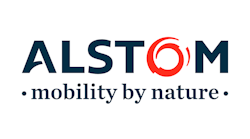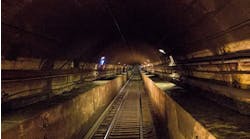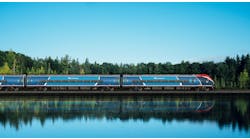"These six first months were marked by the good execution of our various projects as shown by solid operational results in line with our 2020 objectives. Systems sales have strongly increased, supported by the progress of Dubai and Riyadh metros projects. The construction of South Africa and India factories continues. Our innovation capacity is highlighted by the first commercial success for the Coradia iLint, the world’s first hydrogen train. These excellent results demonstrate the success of Alstom’s strategy in a growing market and represent a significant step towards our 2020 objectives. Furthermore, the combination of Alstom with Siemens’ railway activities brings together two innovative players in the mobility market with more unique customer value and operational potential. At this stage discussions with employee representative bodies are ongoing and the deal implementation teams are operational," said Henri Poupart-Lafarge, Alstom chairman and chief executive officer.
2020 strategy on track
Alstom 2020 strategy is based on the five following pillars:
1. Customer focused organization
The Group booked €3,170 million orders in the first half of fiscal year 2017/18. This compares to €6,212 million over the same period last year which included several large projects such as the new generation of high-speed trains with Amtrak in the USA and the extension of Dubai Metro’s Red line with RTA in United Arabic Emirates.
This semester, Alstom signed contracts in all regions, including two contracts in Canada for almost 100 light rail vehicles, a first metro system contract in Vietnam, a metro system contract in Philippines, contracts for regional trains in Italy, Senegal and Germany, a maintenance contract in Sweden, as well as a fleet modernization project in the USA.
At €32.7 billion on 30 September 2017, current backlog provides strong visibility on future sales.
2. Complete range of solutions
In the first half of fiscal year 2017/18, Alstom’s total sales reached €3,756 million, up 5 percent (5 percent organically).
Signalling, systems and services represented 57 percent of sales in the first half of 2017/18, in line with 2020 objective of 60%. Systems sales increased by almost 60 percent with progress of Riyadh and Dubai metro systems. Signalling and Services sales slightly decreased due to an adverse forex impact in the United Kingdom as well as the ramp down of some projects. Rolling stock sales remained stable at €1.6 billon with deliveries of regional and high-speed trains in Europe, the beginning of the Amtrak project in the USA, on-going execution of the PRASA project in South Africa and tramway deliveries in Algeria.
3. Value creation through innovation
Alstom sustained its level of research and development (gross costs) at €101 million, i.e. 2.7 percent of sales, in first half of fiscal year 2017/18. Main programs included the renewal of rolling stock ranges, signalling, and predictive maintenance. In April 2017, Alstom launched several smart mobility technologies to address the evolving needs of both operators and passengers, such as Mastria, the first multimodal supervision solution. Alstom and Airbus also signed a strategic cooperation agreement in the field of cybersecurity. More recently, Alstom and NTL received the Innovation label at Busworld exhibition in Belgium for Aptis, their new mobility experience.
4. Operational and environmental excellence
Alstom delivered an adjusted EBIT of €231 million in first half of 2017/18, compared to €200 million the previous year, representing a 16% increase. The adjusted EBIT margin reached 6.2%, versus 5.6% for last fiscal year. This continuous improvement was driven by volume increase and on-going initiatives for operational excellence. Net income (Group share) reached €213 million.
In September 2017, Alstom improved its score in the Dow Jones Sustainability World and Europe indices with an overall score of 80 out of 100 in the DJSI ranking, which represents a two points improvement compared to previous year. Finally, in October 2017, Alstom scores B at CDP’s climate change questionnaire.
5. Diverse and entrepreneurial people
To reflect Alstom’s passenger base, the company has the ambition to increase diversity. Alstom’s employees around the world all share the same culture, underpinned by strong integrity and ethics values. In June 2017, Alstom obtained ISO 37001 certification for its anti-bribery management system, confirming its commitment to fight corruption.
Solid balance sheet
During the first half of fiscal year 2017/18, the Group free cash flow was positive at €227 million, benefitting from impacts of the Cash Focus programme and favourable cash profile of several projects.
Alstom invested €80 million in capital expenditures in first half 2017/18, compared to €43 million the previous year. As end of September 2017, the cumulated transformation capex stood at €100 million, out of €300 million, with notably the progress in sites’ construction in South Africa and in India.
Alstom net debt amounted to €101 million on 30 September 2017, compared to €208 million on March 31, 2017. Last, equity reached €3,787 million at 30 September 2017, versus €3,713 million at March 31, 2017.
Creation of a global leader in Mobility
On 26 September 2017, Siemens and Alstom signed a Memorandum of Understanding to combine Siemens’ mobility business including its rail traction drives business with Alstom. The transaction brings together two innovative players of the railway market with unique customer value and operational potential. The two businesses are largely complementary in terms of activities and geographies.
Governance
As per the announcement of 26 September 2017, the French State did not exercise the call options on Alstom shares held by Bouygues and restituted them on 17 October 2017. According to declaration published by the AMF (the French financial markets authority) on October 25, 2017, Bouygues holds 62,086,226 shares and 65,347,092 voting rights i.e. 28.15 percent of the capital and 28.95 percent of the voting rights of the Company. In this context, Pascal Faure has presented his resignation from his mandate as director at Alstom. As a consequence, the Board of Directors of Alstom is now comprised of 13 Directors of which 6 women (46 percent) and 7 independent Directors (54 percent)..
Objectives for 2020 confirmed
By 2020 sales should grow organically by 5 percent per year.
Adjusted EBIT margin should reach around 7 percent by 2020 driven by volume, portfolio mix and results of operational excellence actions.
By 2020, Alstom expects c. 100 percent conversion from net income into free cash flow.


